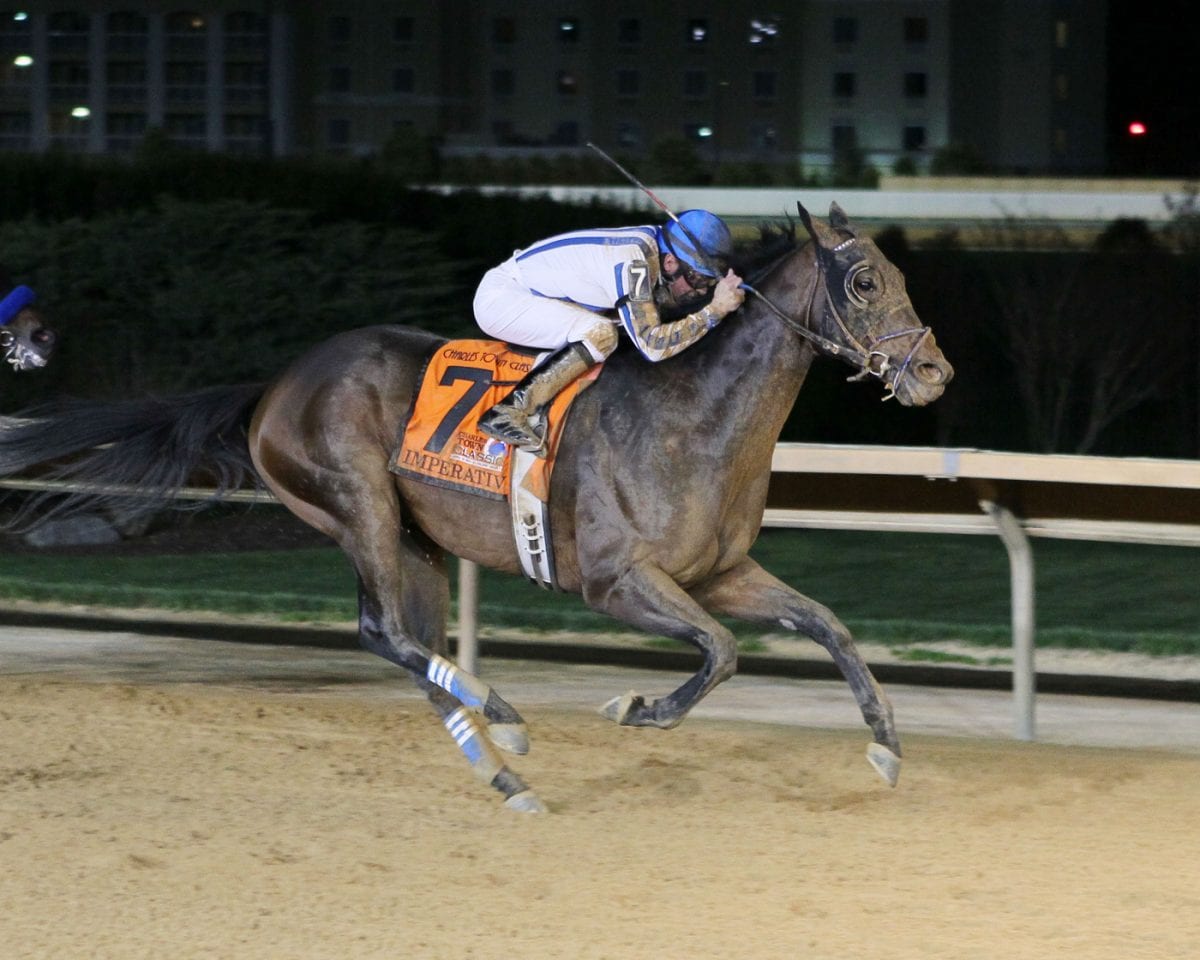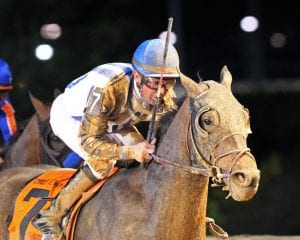by Ted Black
If handle declined for this year’s Grade 2 Charles Town Classic card, why was Erich Zimny smiling?
In the days following the sixth running of the Grade II, $1.5 million Charles Town Classic, while racing fans attempted to grasp the meaning of Imperative’s upset victory over defending champion Game On Dude, Zimny, the track’s Vice President of Racing Operations, and other track officials pondered the successes and failures of the card.
For the third time in the last four years, the Classic attracted Game On Dude, the perennial leading candidate for champion older horse and horse of the year,as well as a handful of solid invaders looking to topple the Bob Baffert trainee. In addition to the horses, the fans have packed the apron for the race and the postrace winner’s circle ceremonies.
Yet handle on the 14-race program — one more race than in ’13 — dropped 18 percent, from nearly $4.4 million a year ago to $3.58 million on Saturday. What’s more, handle for the Classic itself was well shy of last year’s sum.
None of which phased Zimny.
“We just didn’t have the bridge jumpers this year that we did last year,” Zimny explained. Bridge jumpers — bettors who bet large amounts of money on supposed “sure things” to show — were all over last year’s Classic card, plunging roughly $1.3 million in show wagers on it. Most of that went to Lucy’s Bob Boy, 1-9 in the Confucius Say, and Game On Dude, 3-10 in the Classic.
A year ago, there was more than $800,000 wagered into the win-place-show pools of the Confucius Say and nearly $600,000 into those pools in the Classic; this year, those numbers were about $80,000 and $411,000, respectively.
“I think we might have had some bridge jump action on Immortal Eyes in the Webb Snyder and some on Game On Dude in the Classic [this year],” Zimny continued. “But overall those numbers were way down. I think if you take that into consideration, the numbers on the other pools look better.”
Bridge jumpers are, at best, a mixed blessing for racetracks. On the one hand, it means a lot of people are watching the races in question, and some of them will place other wagers or bet other races. On the other, bridge jumping can create “minus show pools,” forcing the track to reach into its own pockets to pay bettors.
Certainly, out-of-town horsemen are fond of the Classic card. Last year the Charles Town Classic got a purse increase from $1 million to $1.5 million and the winner’s share was elevated to a cool $1 million, which helped attract Game On Dude each of the past two years. The purse for the Sugar Maple Stakes for fillies and mares is $200,000 and the pot for the Robert R. Hilton Memorial, which once peaked at $400,000, is now at $100,000.
Sources close to the planning surrounding future Classic night cards have indicated that the track wants to increase the purses for the night to $3 million and would like to increase the share of purses allocated to open stakes to 10 percent, up from the current eight percent.
Zimny flatly denies those rumors.
“That has never been discussed,” Zimny said of the purse increases. “Raising the purses on Charles Town Classic night to $3 million has never been discussed.”
As for increasing the share of the purse account allocated to open stakes, Zimny points out, ” If you look at the stakes purses for other racing jurisdictions, most of them represent much more of the overall purses than what we offer at Charles Town.”
One factor that might have hurt Saturday’s handle was the long lines at the betting windows, especially on the ground floor of the grandstand. Bettors who got in line with less than five minutes to post time often were shut out. Lines often stretched from one bank of tellers to opposing groups of tellers, a fact exacerbated by the number of fans new to wagering trying to bet.
“I was not aware of anyone being shut out,” Zimny said. “I have not heard anything from the tellers or the fans. We don’t have the luxury of bringing in additional tellers like they do at Pimlico for the Preakness. I’m not sure how much that affected the handle.”
Another factor that might have had a small impact was Imperative’s stunning, 26-1 upset of Game On Dude in the Classic. While media types and the public love longshot stories, racetracks like favorites to win, because it means a lot of happy bettors with additional cash in their pockets — cash that they might use to wager on subsequent races.
[pullquote]We had a great crowd and it was the second-highest handle in track history. I think there’s a lot to be said for a night like that.” — Erich Zimny[/pullquote]“When a 26-1 shot [Imperative] wins the Classic and beats your odds-on favorite,” Zimny pointed out, “there goes the churn.”
Charles Town will offer another similar card featuring a quartet of open stakes races on September 20 when the track presents the Grade III, $500,000 Charles Town Oaks for three-year-old fillies. That race’s elevation to graded status — this year is its first with a grade — will mark the first time in the track’s 81-year history that it will have two graded stakes in the same year. There are also three other $100,000 open stakes and three restricted stakes for West Virginia-breds looking to prep for the West Virginia Breeders Classics here on October 18.
“I think with each of the big nights we tend to look back and try to take what we’ve learned from each of them and apply that knowledge moving forward,” Zimny said. “I’ve always contended that people come to the races to see quality stakes and top horses like Game On Dude. I thought Classic night validated that. We had a great crowd and it was the second-highest handle in track history. I think there’s a lot to be said for a night like that.”
(Featured photo of Imperative by Coady Photography.)
NOTE: This version of the article, posted at 1:35 p.m., differs from the originally posted version. Among the edits: 1) Zimny did say, as quoted here, that wagering in the non-show pools was stronger than the overall handle numbers would suggest. He did not place a specific percentage increase on them, as our original story indicated. 2) Charles Town Classic night 2014 was the track’s second-highest handle ever, not third. 3) In the original, Zimny’s quote regarding the track’s rumored proposal to increase CT Classic night purses left a misimpression regarding the track’s future plans. The quote has been clarified. We apologize for the errors.














